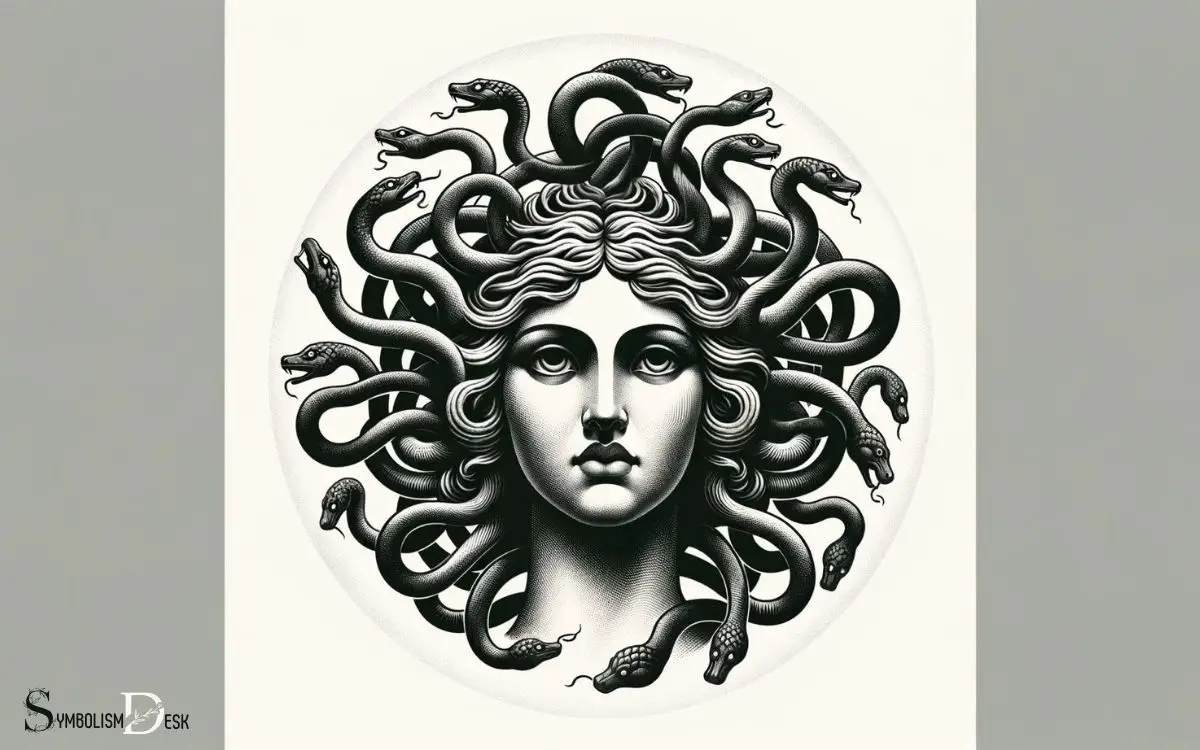What Does Medusa Tattoo Symbolize? Protection!
The Medusa tattoo symbolizes a range of meanings including transformation, protection, empowerment, and defiance.
It is a powerful icon that can represent personal growth, resilience against adversity, and the ability to overcome challenges. Additionally, it has been embraced by some as a symbol of feminist strength and solidarity.
Medusa is a figure from Greek mythology whose story has evolved over time. Originally portrayed as a monstrous creature with snakes for hair, anyone who gazed upon her face would turn to stone.
However, in modern interpretations, Medusa is often seen as a symbol of:
A Medusa tattoo is not just a piece of art but a profound statement of overcoming adversity and reclaiming one’s power.

Key Takeaway
Medusa Tattoo Origins
The origin of the Medusa tattoo dates back to ancient Greek mythology. Medusa, a Gorgon with snakes for hair, was once a beautiful maiden cursed by Athena. In Greek mythology, she’s known for turning onlookers into stone with a single glance.
The Medusa tattoo is often depicted as a powerful and fearsome image, symbolizing protection and warding off evil spirits. Many people choose to incorporate the Medusa image into their tattoos as a way to harness her legendary strength and energy. In addition to Medusa tattoo symbolism, another popular choice is the eye tattoo symbolism, which is often associated with wisdom, clairvoyance, and the ability to see beyond the physical realm. Both of these tattoo symbols carry significant meaning and can serve as a source of empowerment for those who choose to adorn themselves with these images.
In some interpretations, it also represents the power of femininity and the complexities of female identity.
The mythological significance of the Medusa tattoo has evolved over time, with modern interpretations often focusing on themes of empowerment, resilience, and the ability to overcome challenges.
Symbolizing both beauty and terror, the Medusa tattoo continues to captivate and intrigue enthusiasts, offering a timeless connection to ancient Greek mythology.
Medusa’s Gaze and Power
A prominent feature of Medusa’s mythology is her ability to petrify with a single glance. This power is a central aspect of her symbolism and is often depicted in art and literature.
Medusa’s gaze represents not just physical power, but also the ability to subdue and control others through fear and intimidation.
Her gaze is a symbol of dominance and strength, as well as a warning against the dangers of unchecked power.
It serves as a reminder of the consequences of arrogance and hubris. The imagery of Medusa’s gaze evokes fear, caution, and respect, and it’s a potent representation of the complex and multifaceted nature of power.
Symbolism of Snakes in Medusa Tattoos
Symbolism of snakes in Medusa tattoos represents a connection to ancient Greek mythology and the intertwining themes of transformation and duality.
In Greek mythology, snakes are often associated with healing, transformation, and renewal, as well as with danger and the unknown.
The intertwining nature of snakes in Medusa’s hair symbolizes the complex and multifaceted nature of the Gorgon herself. It represents the dualities of life – creation and destruction, beauty and horror, life and death.
The snake shedding its skin is a powerful symbol of rebirth and regeneration, echoing the transformative powers of Medusa.
The use of snakes in Medusa tattoos can also signify the ability to harness and channel one’s inner power, embracing both the light and dark aspects of one’s personality.
Medusa as a Feminist Icon
Representing a powerful and complex figure in mythology, Medusa is celebrated by some as a feminist icon due to her embodiment of strength, resilience, and defiance against oppressive forces.
She’s become a symbol of empowerment and liberation, inspiring women to embrace their inner strength and challenge societal norms.
Here’s why Medusa is considered a feminist icon:
- Defiance: Medusa defied the expectations of her time, refusing to conform to traditional gender roles.
- Independence: She existed independently from male influence, asserting her autonomy and agency.
- Resilience: Overcoming adversity, Medusa exemplifies resilience in the face of trauma and victimization.
- Empowerment: Her gaze, once feared, becomes a symbol of empowerment, challenging the male gaze and reclaiming her own narrative.
- Transformation: Medusa’s transformation from victim to powerful figure symbolizes the potential for personal growth and empowerment.
Medusa and Beauty Standards
Medusa challenges conventional beauty standards by existing as a powerful and complex figure in mythology, transcending societal expectations and norms.
In Greek mythology, she’s often depicted as a monstrous creature with snakes for hair and a gaze that turns people to stone.
This portrayal stands in stark contrast to traditional ideals of beauty, which typically emphasize youth, symmetry, and perfection.
Medusa’s defiance of these norms challenges the notion that beauty is solely defined by physical appearance.
Instead, her story forces a reconsideration of beauty as a multifaceted concept that encompasses strength, resilience, and individuality.
Medusa as a Protector
As a guardian, Medusa embodies protection and empowerment in various interpretations. In the realm of symbolism, Medusa’s image is often associated with the idea of protection, serving as a shield against harm and adversity.
Here are several ways in which Medusa is viewed as a protector:
- Warding off Evil: Medusa’s petrifying gaze is seen as a means of safeguarding against malevolent forces.
- Defending the Vulnerable: In some interpretations, Medusa is depicted as a defender of the oppressed and a champion of justice.
- Empowering Women: She symbolizes feminine strength and resilience, offering protection and empowerment to women.
- Guardian of Secrets: Medusa is often connected to the concept of guarding valuable knowledge and secrets.
- Shielding from Harm: Her serpentine hair is seen as a form of protection, shielding those who seek her guidance from harm.
Medusa’s role as a protector holds deep significance, resonating with individuals seeking strength and safeguarding in various aspects of life.
Medusa’s Transformation Narrative
Following her fateful transformation at the hands of Athena, Medusa’s visage has become synonymous with a tale of tragedy and change.
The narrative of Medusa’s transformation is a compelling one, representing the themes of punishment, loss, and ultimately, empowerment.
Here is a visual representation of the key elements of Medusa’s transformation narrative:
| Transformation Narrative | Description |
|---|---|
| Punishment by Athena | Medusa’s punishment by Athena, which transformed her into a Gorgon, is a pivotal moment in her story. |
| Loss of Identity and Beauty | The transformation resulted in the loss of Medusa’s beauty and her identity as a mortal woman. |
| Empowerment and Resilience | Despite the tragic transformation, Medusa’s story also symbolizes empowerment and resilience. |
Medusa’s transformation narrative is a complex and layered story that has captivated audiences for generations, serving as a powerful symbol of both tragedy and strength.
Conclusion
The Medusa tattoo symbolizes a complex blend of power, transformation, and defiance. Its origins in Greek mythology and its association with snakes and the gaze reflect a deep symbolism that resonates with many individuals.
As a feminist icon, Medusa challenges traditional beauty standards and represents a form of protection against harm.
The Medusa tattoo carries a rich narrative that continues to captivate and inspire those who choose to adorn themselves with her image.






